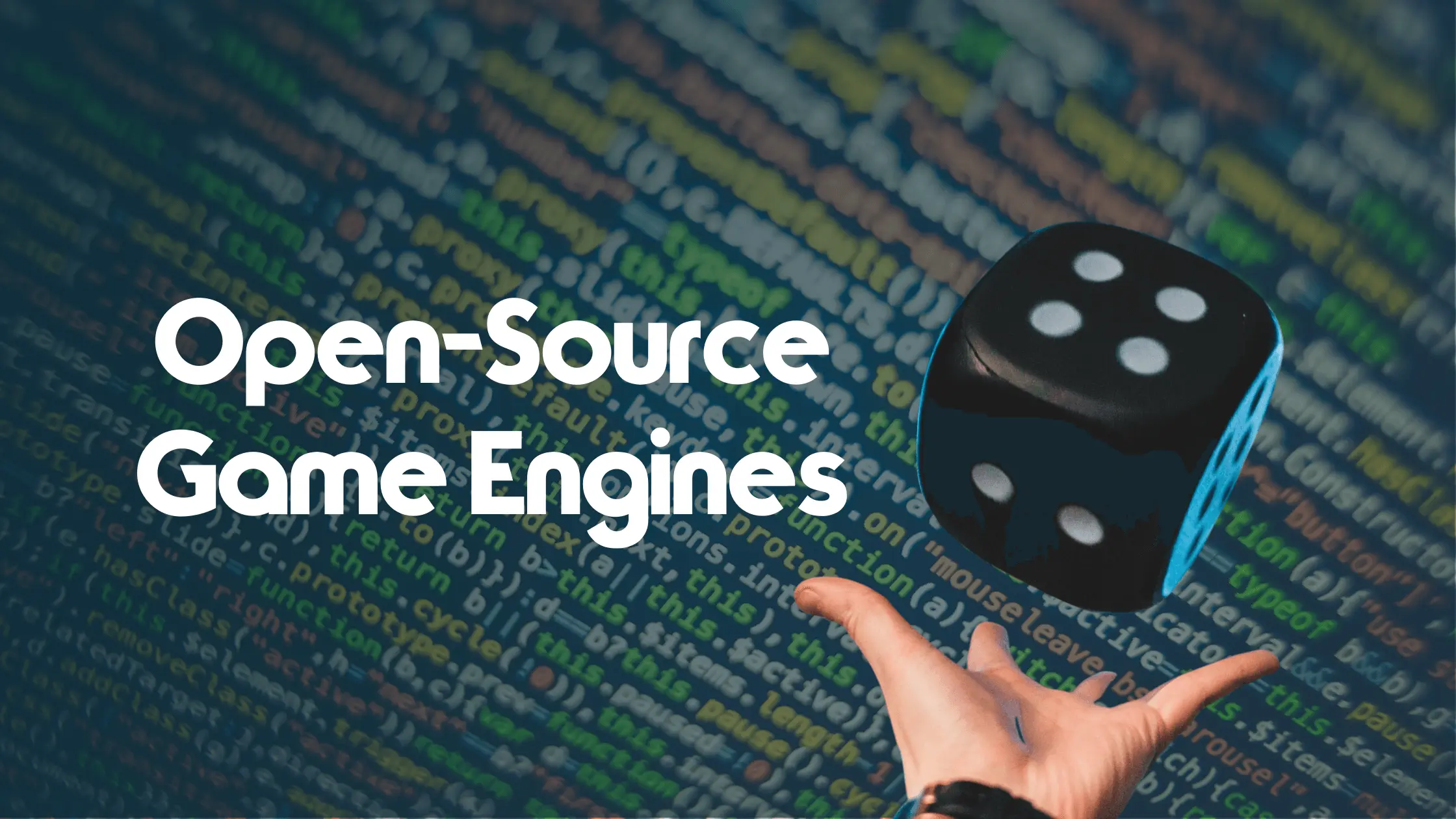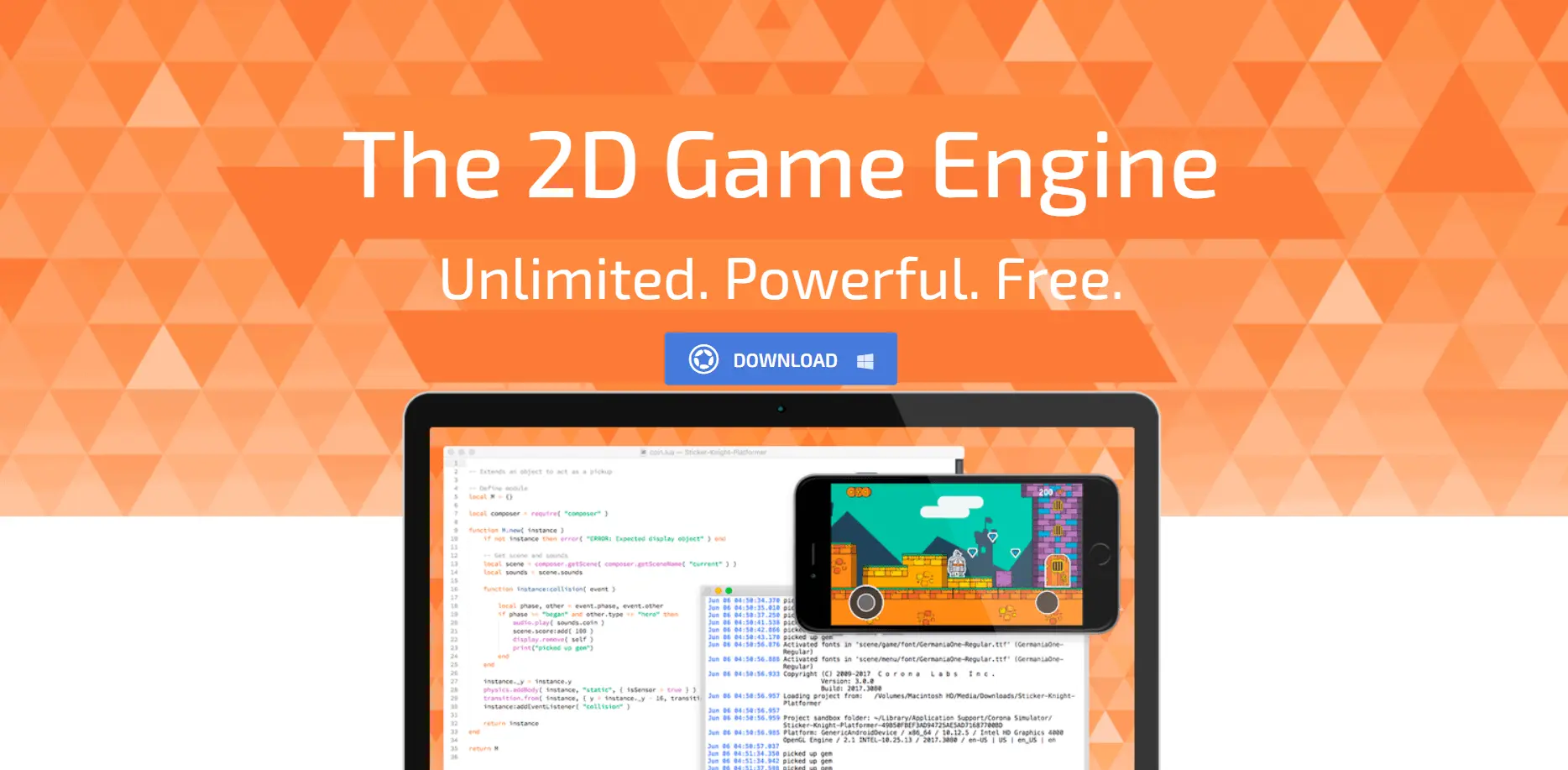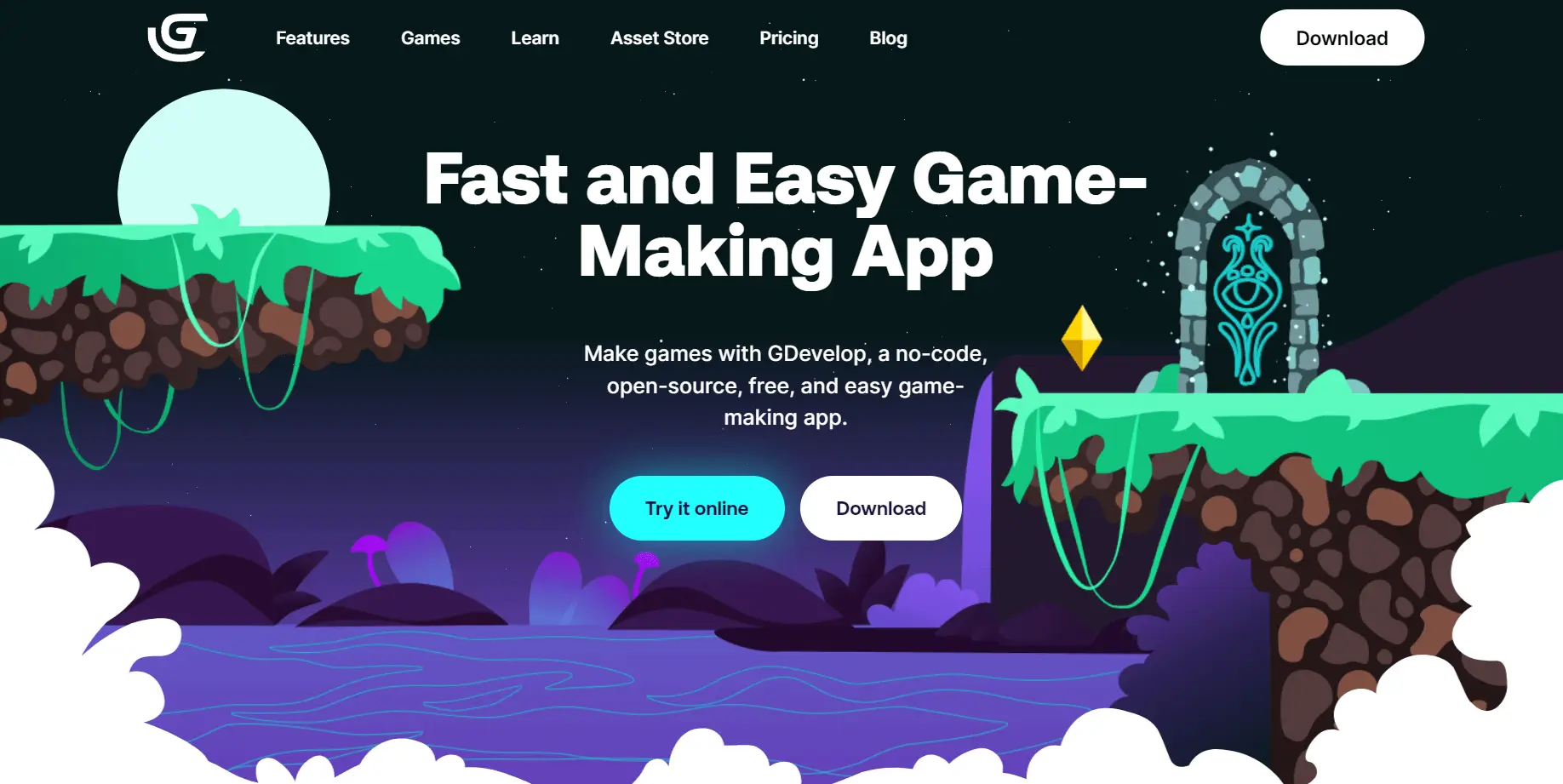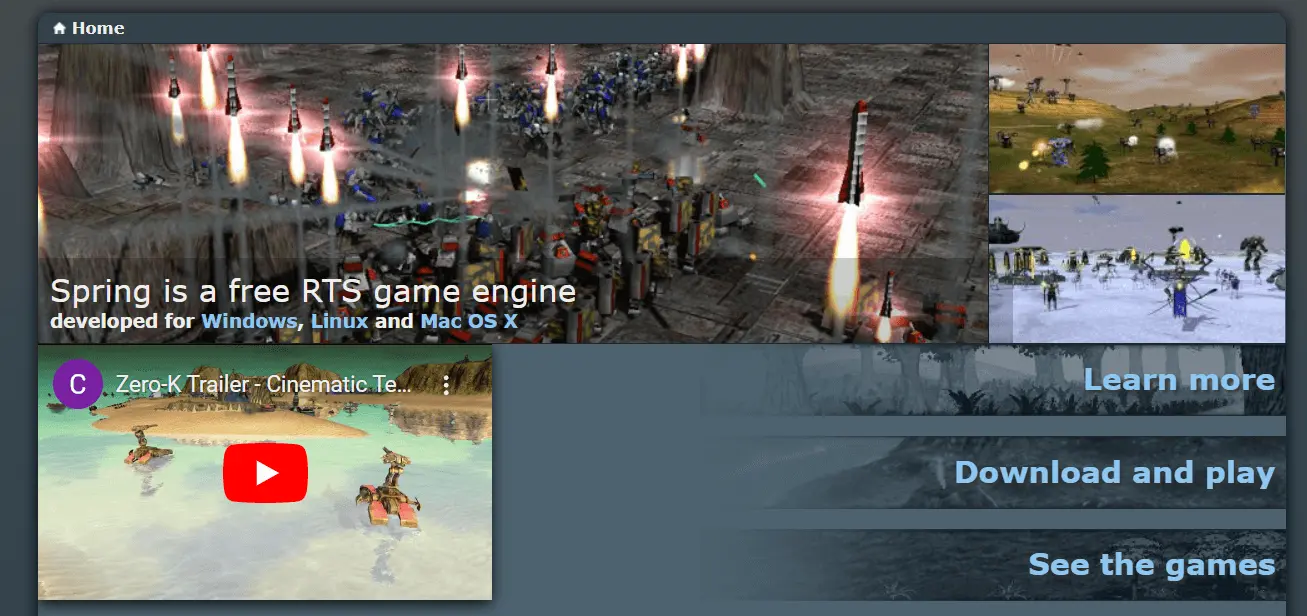Are you passionate about game development? Do you dream of creating interactive worlds and engaging gameplay experiences? Open source game engines can be the key to turning your dreams into reality.

We’ve discussed popular game engines, including Gamemaker, Unity, RPG Maker, and Unreal, along with highlighting a variety of titles developed using these engines. This article will explore the world of open-source game engines, their benefits, features, and how they have revolutionized the gaming industry.
What are Open Source Game Engines?
Open-source game engines are software frameworks that provide the necessary tools, libraries, and functionality for creating video games. These engines are developed collaboratively by a community of developers, and their source code is made freely available for anyone to use, modify, and distribute.
Importance of Open Source Game Engines
Open-source game engines have gained immense popularity in recent years due to their numerous advantages. Through community-driven development, they offer cost-effectiveness, customization, flexibility, and continuous improvement. Let’s delve deeper into these benefits.
Benefits of Open Source Game Engines
- Cost-effectiveness
Unlike commercial game engines that often have high licensing fees, open-source game engines are typically free. This accessibility eliminates financial barriers, allowing developers with limited resources to create games without compromising quality. - Community-driven Development
Open-source game engines thrive on community collaboration. Developers from around the world contribute to the improvement and expansion of these engines. This collective effort leads to faster bug fixes, innovative features, and a wealth of learning resources and support. - Customization and Flexibility
Open-source game engines offer unparalleled customization options. Developers can modify the source code to tailor the Engine to their needs, whether creating unique gameplay mechanics, implementing custom shaders, or integrating third-party tools and libraries. This level of flexibility empowers game creators to bring their visions to life with precision and creativity. - Continuous Improvement and Updates
Open-source game engines benefit from a vibrant community that constantly contributes to their enhancement. Bug fixes, performance optimizations, and new features are regularly implemented, ensuring the engines stay updated with the latest industry trends and technological advancements. Developers can use these updates to deliver high-quality, polished games to their audience.
Top 8 Popular Open Source Game Engines
Several open-source game engines have gained popularity and have become go-to choices for developers of all skill levels. Let’s explore three prominent options:
- CoronaSDK
- GDevelop
- Spring Engine
- Panda3D
- Cocos2d-x
- Xenko
- Luxe
- Godot
You may ask yourself, “What is an open-source game engine?”
We all understand that Game engines are tools for game developers to code and develop a game quickly and conveniently. What makes open-source engines unique, then? The simple fact is that the original engine source code is made freely available and may be redistributed and modified.
1. CoronaSDK
A free cross-platform framework that is ideal for creating 2D titles and apps for Android, iOS, and PC platforms, including Windows and Mac. Corona even supports TV platforms such as Apple TV, Fire TV, and Android TV. Corona Labs has recently decided to make CoronaSDK open source, making the engine development process more transparent while empowering the community to directly impact future growth and potential.
 Image: CoronaSDK Game Engine
Image: CoronaSDK Game Engine
CoronaSDK is now dual-licensed under commercial and open source license GNU GPLv3. The difference being the download and use of the Corona source code means any title you develop, be it a game or app, will require your source to be equally available.
The core programming language began with Lua, later adding native extensions for other languages, including C, C++, Objective-C, Java, and HTML5.
Some hall-of-fame apps built with Corona include Tiny Boxes, Ava Airborne, and Scale.
2. GDevelop
Second, on our open-source game engine list is the 2D game engine GDevelop, a cross-platform engine designed to be used by everyone – programming skills are not required.
What makes GDevelop unique is the use of event logic found in similar game engines such as RPG Maker. GDevelop provides users with a plug-and-play option that removes the requirement of learning a programming language while still providing the option to extend parts of your game with JavaScript and HTML coding.
 Image: GDevelop Game Engine
Image: GDevelop Game Engine
Further Reading: How to Make Games Without Coding
Developers are also given the option to include ads, reward videos, and product links via Shopify. The one-click deployment option allows developers to export their game to numerous platforms, including Android, iOS, Windows, Mac, Linux, and Facebook Instant Games. It also includes options for itch.io and Kongregate.
Popular indie titles developed using the GDevelop game engine include Lil BUB’s HELLO EARTH and Hyperspace Dogfights.
3. Spring Engine
A 3D RTS open-source engine. Using Lua and C++, developers can customize every aspect of this engine, including the user interface, AI, and pathfinding modules.
Spring Engine is unique in its origins as it originally began as an RTS game and was later developed into an open-source game engine. It was to be used by the original developers and others to create and produce additional RTS-based titles under the GNU General Public License.
 Image: Spring Engine Game Engine
Image: Spring Engine Game Engine
This guarantees end users the freedom to run, study, share, and modify the software.
Features of the Spring Engine include: – Support for battles of up to 5000 units – Support for large maps that feature deformable terrain, forest fires, dynamic water, and custom skyboxes – Fully 3D combat in land, sea, and air – Complex 3rd-party AIs, and more.
Titles developed with Spring Engine include Zero-K and Spring: 1944.
4. Panda3D
Initially developed by Disney Interactive, Panda3D was implemented to create various 3D attractions for Disney theme parks, including Aladdin’s Magic Carpet.
It became open source in 2008 under the modified BSD license, which has minimal restrictions on the use and distribution of software, merely requiring that all code retain the BSD license notice if redistributed in source code format.
 Image: Panda3D Game Engine
Image: Panda3D Game Engine
Panda3D was created using the C++ language, with the intended development language being Python for faster development. Building platforms include Windows, Mac, and Linux, with the potential for Android.
Aside from being used for Disney’s development projects, this engine can be used for game development, visualizations, and experiments. Panda3D has been used for several university courses, open-source projects, and large commercial games, including Pirates of the Caribbean Online, Toontown Online, and Profit Colony.
5. Cocos2d-x
Just one branch of the Cocos2d open-source game framework is written in C++. Cocos2d-x is widely used to build games and apps for mobile platforms.
The complete list of supported platforms includes iOS, Android, Tizen, Windows, Windows Phone 8, Linux, and Mac. Containing a brand new Graphic Renderer, the Cocos2d-x renderer is optimized for 2D graphics with OpenGL.
 Image: Cocos Game Engine
Image: Cocos Game Engine
It supports skeletal animation and sprite sheet animation and adopts a RenderQueue design. Maintained by its community, Cocos2d-x is licensed under the MIT license, which provides a minimal restriction on reuse.
Cocos2d-x enables using three programming languages, including C++, Javascript, and Lua. Popular cross-platform titles created using Cocos2d-x include Hill Climb Racing, Dragon City, and Family Guy: The Quest for Stuff.
6. Xenko
A free, open-source 2D and 3D cross-platform game engine that Silicon Studio initially developed. Having become an open-sourced, community-driven project in 2018, it has been used in creating games for Windows, Linux, Android, iOS, PS4, and Xbox One.
Recently Xenko has been renamed to Stride.
It is also VR-ready, with the option to enable VR with a single click. Xenko contains:
- Built-in templates.
- A complete asset creation toolchain.
- A flexible and customizable rendering pipeline for accelerated development.
It is licensed under the MIT license.
Xenko showcases multiple projects that use their game engine within their community pages. You can find the Xenko-made game, Children of the Galaxy on Steam.
7. Luxe
A game engine still in development but promises excellent potential for both 2D and 3D titles.
Written in C++, the intended programming language will be Wren, with the hope of being flexible enough to use any language further down the development line.
The core principle of Luxe is to be built around various tools and modules rather than features. Through the use of modules, the developers of Luxe have prevented the system from becoming unfocused and bloated, allowing users to choose the precise tools they need for their game development.
Building platforms for the Luxe game engine include Windows, Mac, Linux, iOS, Android, and Web. Despite its Alpha state, various titles have been released using Luxe, including The Westport Independent, Topsoil, and Operator Overload.
8. Godot
Godot is a 2D and 3D cross-platform compatible engine released under the MIT license. Some of Godot’s features include A built-in node system featuring hundreds of nodes, each with its behaviors, A visual editor, Persistent live editing, And the ability to create your own tools languages supported include GDScript, C#, C++, and more – including visual scripting!
 Image: Godot Game Engine
Image: Godot Game Engine
Godot is well known for its functionality on teamwork-based projects. They allow team members to share files and work simultaneously on the same project.
It has an intuitive and full-featured interface that the indie game community loves. Building platforms include Windows, Mac, Linux, UWP, BSD, Haiku, Android, iOS, and the web. Past Titles created using Godot include Deep Sixed, StereoBreak, and Grimante.
Features and Capabilities of Open Source Game Engines
Open-source game engines have various features that empower developers to create immersive and engaging gaming experiences. Let’s explore some essential capabilities:
- Graphics and Rendering
Open-source game engines offer advanced graphics and rendering capabilities. From real-time lighting and shadows to post-processing effects and particle systems, these engines enable developers to achieve stunning visuals and lifelike environments. - Physics Simulation
Physics simulation is crucial for creating realistic interactions and dynamic gameplay. Open-source game engines provide robust physics engines that handle collision detection, rigid body dynamics, and character controllers, allowing developers to achieve accurate and immersive physical simulations. - Audio Systems
Sound design plays a significant role in creating an immersive gaming experience. Open-source game engines provide audio systems that support spatial audio, dynamic sound mixing, and integration with popular audio middleware, enabling developers to create captivating and interactive audio environments. - Scripting and Programming Languages
Open-source game engines offer scripting and programming languages that facilitate game development. These languages, such as Python, Lua, or custom scripting languages, allow developers to quickly and flexibly implement game logic, AI behaviours, and gameplay mechanics. - Asset Management and Import/Export
Efficient asset management is crucial for organizing game assets, such as models, textures, animations, and audio files. Open-source game engines provide tools and workflows for importing, managing, and exporting assets, streamlining the game development process and improving productivity. - Cross-platform Compatibility
Open-source game engines often prioritize cross-platform compatibility, allowing developers to create games that can run on multiple platforms with minimal effort. Whether it’s PC, mobile, web, or console, these engines provide the tools and frameworks to deploy games across various platforms, reaching a broader audience.
Getting Started with Open-Source Game Engines
If you’re ready to embark on your game development journey with open-source game engines, here are some essential steps to get you started:
1. Choosing the Right Engine for Your Project
Research and evaluate different open-source game engines based on your project’s requirements. Consider the Engine’s features, community support, documentation, and learning resources. Select an engine that aligns with your goals and skill level.
2. Setting up the Development Environment
Once you’ve chosen an engine, follow the installation instructions provided by the Engine’s documentation to set up your development environment. Ensure you have the necessary software and dependencies installed, and configure the Engine according to your preferences.
3. Learning Resources and Tutorials
Open-source game engines have extensive learning resources, including tutorials, documentation, forums, and community-driven support channels. Use these resources to familiarize yourself with the Engine’s features, workflows, and best practices. Online communities and forums can also provide valuable guidance and feedback as you develop your game.
4. Building a Sample Game
Start by building a sample game or prototype to get hands-on experience with the Engine’s tools and features. This practical approach allows you to learn through experimentation and problem-solving, gaining insights into various aspects of game development, such as asset creation, scripting, and gameplay mechanics.
Open Source Game Engines for Different Platforms
Open-source game engines cater to various platforms, ensuring developers have options for their target audience. Let’s explore some popular media and the corresponding open-source game engines:
1. PC and Desktop Platforms
Open-source game engines like Unity, Godot, and Unreal Engine provide comprehensive support for PC and desktop platforms. These engines offer potent tools and optimization options to create games running smoothly on various PC configurations.
2. Mobile Platforms
Mobile game development is rising, and open-source game engines have kept pace with the demand. Engines like Unity and Godot provide dedicated mobile support, allowing developers to create engaging games for iOS and Android devices. These engines offer mobile-specific optimizations, touch input handling, and performance tweaks to ensure optimal gameplay experiences on mobile platforms.
3. Web and Browser-based Platforms
Open-source game engines like Godot and Phaser are popular web and browser-based game development choices. These engines leverage HTML5 and JavaScript to create games that can be played directly in web browsers, eliminating the need for additional installations or plugins.
4. Console Platforms
Developing games for console platforms traditionally required proprietary software and licenses. However, with the rise of open-source initiatives, some engines, like Unreal Engine, have started offering console development support. This opens up opportunities for independent developers to create games for platforms such as PlayStation, Xbox, and Nintendo Switch.
Open Source Game Engines vs. Commercial Game Engines
You may wonder how open-source game engines compare to their commercial counterparts when considering game development. Let’s explore some key factors to consider:
1. Licensing and Legal Considerations
Commercial game engines often come with licensing fees and restrictions on the use and distribution of your games. On the other hand, open-source game engines provide more freedom in terms of licensing and allow you to use, modify, and distribute the Engine’s source code without significant limitations. This flexibility can be advantageous, especially for independent developers or small studios with budget constraints.
2. Support and Documentation
Commercial game engines usually provide dedicated support teams and extensive documentation to assist developers. They often offer comprehensive tutorials, troubleshooting guides, and forums where developers can seek help. Open-source game engines also have active communities and forums, but the level of support may vary. However, the collaborative nature of open-source development can lead to faster bug fixes and community-driven support.
3. Learning Curve and Accessibility
Commercial game engines often prioritize user-friendly interfaces and intuitive workflows to attract a broader user base. They may provide visual scripting systems or drag-and-drop functionality, making it easier for beginners to get started. Open-source game engines can have a steeper learning curve, especially for those unfamiliar with programming or game development concepts. However, the availability of learning resources, tutorials, and community support can help bridge this gap.
4. Monetization Options
Commercial game engines usually provide built-in monetization options, such as in-app purchases, advertising frameworks, or licensing models for retail distribution. Open-source game engines may need more out-of-the-box monetization features. However, they offer the flexibility to integrate third-party monetization solutions or develop custom monetization strategies tailored to your needs.
Case Studies: Successful Games Built with Open Source Engines
Open source game engines have proven their capabilities by powering successful and influential games. Here are a few examples:
Example Game 1: “Untitled Goose Game” – Developed with Unity
“Untitled Goose Game” developed by House House gained widespread popularity for its unique and humorous gameplay. It showcased the versatility of Unity as an open source game engine, enabling developers to create innovative experiences that resonate with players worldwide.
Example Game 2: “Slay the Spire” – Developed with Godot
“Slay the Spire” developed by Mega Crit Games is a highly acclaimed roguelike card game. The success of this game highlights the capabilities of Godot as an open source engine, empowering developers to create complex gameplay mechanics and engaging experiences.
Open Source Game Engines for Indie Developers
Open source game engines have played a crucial role in empowering indie game developers. They provide a cost-effective and accessible platform for creative expression. Indie developers can leverage the collaborative opportunities and community support offered by open source engines to create unique and impactful games.
Future of Open Source Game Engines
The future of open source game engines looks promising. With the growing interest in game development and the continued advancements in technology, open source engines are likely to witness further innovation and improvements. They will continue to shape the gaming industry by providing accessible tools, fostering collaboration, and pushing the boundaries of what is possible in game creation.
Conclusion
Open source game engines have revolutionized the game development landscape. Their cost-effectiveness, customization options, community-driven development, and wide range of features make them attractive choices for developers of all levels. Whether you’re a hobbyist, an indie developer, or even a professional studio, open source game engines offer the tools and flexibility to bring your creative ideas to life.
With their growing popularity, extensive community support, and success stories from notable games, open source game engines are poised to shape the future of game development.
Alby Abraham is an technology enthusiast, published blogger, and a content marketer who spends his time on building a career in the digital marketing industry. He also writes a blog on The Last Words for tech lovers.

I was very pleased to find this site. I wanted to thank you for your time for this particularly wonderful read!